Cockatiel Care: Choosing the Right Cage
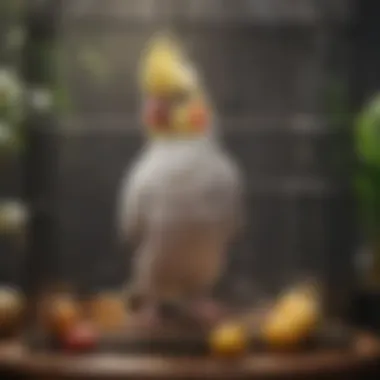
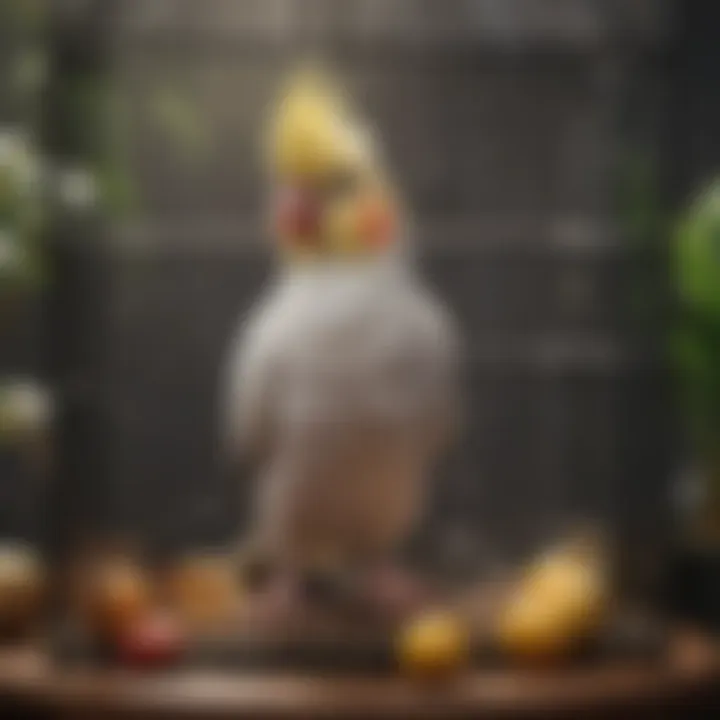
Intro
Owning a cockatiel is much more than simply providing food and water. The environment in which these charming birds live plays an essential role in their overall well-being. The right cage can make a world of difference in your cockatiel's happiness and health. This article dives into the nitty-gritty of cockatiel care, focusing on the different aspects of cage selection.
From understanding dimensions and materials to the significance of enrichment and social interaction, we’ll explore everything you need to know about creating a positive environment for your feathered friend. Let’s embark on this avian journey.
Avian Care Basics
Cockatiels are unique creatures. They have particular needs that, when met, can lead to a thriving pet bird. Here’s a rundown of the essentials of avian care that every cockatiel owner should be aware of.
Importance of Proper Nutrition
Nutrition is at the heart of any pet's care, particularly for birds. A cockatiel’s diet should consist of a balanced mix of seeds, pellets, fruits, and vegetables.
- Seeds are often attractive but shouldn't be the only food choice—they tend to be high in fat and low in essential nutrients.
- Pelleted diets offer a more well-rounded nutritional scope, ensuring that your cockatiel gets the essential vitamins and minerals.
- Fresh fruits and vegetables like leafy greens or carrots can add variety and health benefits to their meals.
Establishing a consistent feeding schedule can help monitor your bird's eating habits as well.
Understanding Bird Species and Their Needs
Cockatiels, specifically, require not just basic care but also specific attention based on their behaviors and characteristics. Understanding these birds will enable you to better cater to their needs. For instance, cockatiels love to play and explore. They thrive in environments that mimic a more natural habitat.
Basics of Birds Habitat Setup
Setting up a cockatiel’s habitat isn't merely about providing a cage. It’s about creating a suitable space that promotes mental stimulation and comfort. The cage should be spacious enough for your bird to fly a little. A height of at least 24 inches, with a width of 18 inches and depth of 18 inches, is often suggested as a minimum.
- Cage Material: Stainless steel or powder-coated metal is recommended for durability and safety.
- Placement: Try to situate the cage in a lively part of the house where your bird can interact with family members. Avoid direct sunlight or constant drafts.
Grooming and Hygiene Tips
Keeping your cockatiel clean and well-groomed is fundamental to their health. Regular bathing, whether through a specific bird bath or a gentle misting with a spray bottle, helps maintain their feathers. Nails can be trimmed as needed, but always consult a vet if you are uncertain.
Interacting with Your Pet Bird
Connecting with your cockatiel goes beyond simply cleaning its cage and providing food. Interaction nurtures bonds and supports their emotional well-being.
Building Trust and Connection
To build a solid relationship with your cockatiel, patience is key. Spend time simply sitting near the cage, allowing your bird to become accustomed to your presence. Gradually, you can start offering treats or speaking softly. Just like humans, birds have their personalities—some may warm up quickly, while others take more time.
Training Techniques and Tips
Training your cockatiel can be a rewarding experience. Basic commands, such as ‘step up’ or ‘come here’, can be taught using positive reinforcement. Using treats will encourage better behavior and make the sessions enjoyable for both of you. Remember, consistency is crucial.
Fun Activities for Bird Owners and Their Birds
Engaging activities can stimulate your cockatiel’s mind. Toys are an excellent way to keep your bird occupied. Rotate different types of toys regularly to maintain your bird’s interest. Activities like hide-and-seek or teaching new tricks can also enhance the bond you share.
Recognizing Bird Cues and Behaviors
Paying attention to your cockatiel's body language is essential. Understanding when they are happy, stressed, or annoyed can change the way you interact with them. Cockatiels express emotions in various ways, such as fluffing their feathers or whistling. Stay attuned to these signals.
Emotional Well-Being of Birds
Cockatiels, being social creatures, require interaction to stay emotionally healthy.
The Role of Play and Socialization
Like humans, birds benefit from play. Encourage socialization not only with their human companions but also, if feasible, with other birds. In social settings, they can exhibit more natural behaviors and reduce stress.
Enhancing Birds' Emotional Health
Providing a range of toys and perches can bolster a cockatiel's happiness. Mixing things up—using swings, ladders, or hanging treats—can provide much-needed enrichment.
Assessing Bird Stress and Remedies
Birds can experience stress just like any other pet. Recognizing changes in behavior or appetite is essential. If they seem withdrawn, discuss with your vet as this could signal underlying health issues.
Building Strong Human-Bird Bonds
Developing a bond with your cockatiel is a gradual process. Make it a routine to talk and spend time with them daily so they grow comfortable around you. Your presence and interaction matter.
Bird Health and Safety
Ensuring the health and safety of your cockatiel involves several components. Regular check-ups with a veterinarian familiar with avian care are necessary to keep your bird healthy.
Common Health Issues and Prevention
Some common problems include feather plucking and respiratory infections. Monitoring their environment and diet can help prevent many health risks.
Routine Veterinary Care
Schedule annual vet visits for check-ups and vaccinations to maintain your bird's health. Regular check-ins can catch potential issues early on, keeping your cockatiel happy.
Environmental Hazards to Avoid
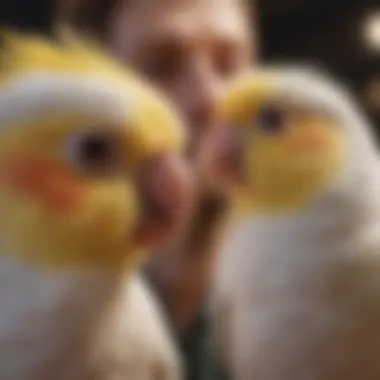
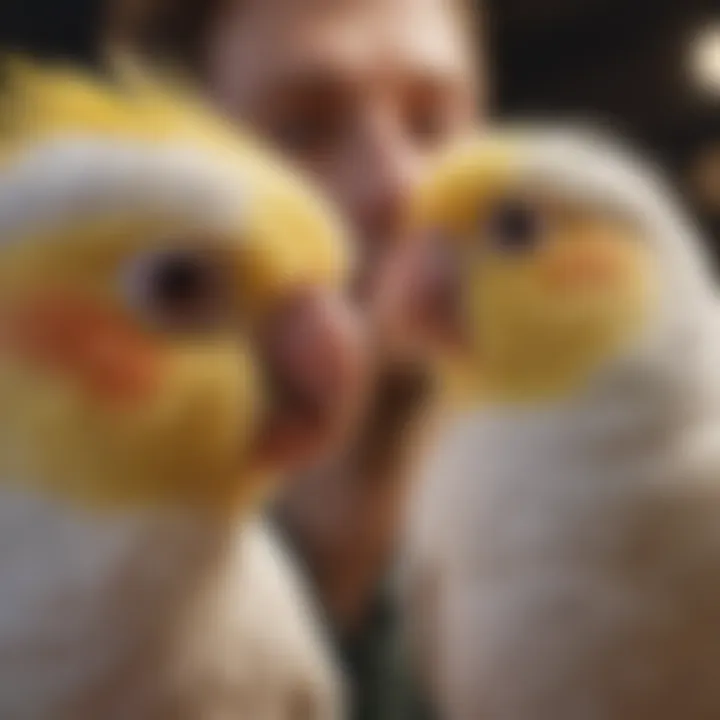
Be cautious about fumes from non-stick pans, smoking, and certain plants that are hazardous to birds. Every little change in their environment can impact their health.
Signs of Illness or Distress
Watch out for drastic changes in behavior, such as puffed-up feathers, lethargy, or reduced vocalization. If notices these signs, don’t hesitate to consult a vet immediately.
Fun Facts and Quirky Insights
Every bird has its unique traits. Learning these can enhance your understanding of your cockatiel.
Unique Traits of Popular Bird Species
Cockatiels are known for their affectionate nature. They can often mimic simple sounds and enjoy being with people. They possess a charm that is hard to resist.
Historical and Cultural Significance of Birds
Birds have been symbolized in various cultures, representing freedom and hope. They often feature in art and literature, highlighting their importance through the ages.
Famous Bird Owners and Their Stories
Several celebrities have formed bonds with their birds, showcasing the affection and joy that comes with avian companionship. These stories stand to remind us of the unique relationships we can cultivate with our feathered friends.
Remember, a happy cockatiel is a well-cared-for cockatiel.
Prelude to Cockatiel Care
Caring for a cockatiel goes beyond just feeding and keeping it company. The essence of a healthy, happy cockatiel life revolves around understanding its specific needs and the role that the right environment plays in fulfilling them. For new bird owners, diving into the nuances of cockatiel care can feel overwhelming at times. However, having a solid grasp on the fundamental aspects can significantly enhance the bonding experience.
Cockatiels, known for their charming personalities and social behavior, require more than just a cage to thrive. The choice of cage, its placement, and the environment set the stage for their overall well-being. A proper understanding of these factors helps ensure that your feathered companion is not just surviving, but truly living its best life.
Overview of Cockatiel Characteristics
Cockatiels are engaging little creatures, full of quirks. Their affectionate nature and playful antics make them popular pets. Generally a member of the parrot family, they possess some unique traits that every potential owner should know. For one, their vocal abilities are impressive; from soft whistling to chirps, cockatiels love to communicate.
As for physical attributes, these birds typically have a medium size, usually ranging between 12 to 14 inches from head to tail. The most common coloration includes shades of gray, with striking yellow and orange cheek patches.
Moreover, cockatiels enjoy being interactive. They thrive on companionship, not just from their human caretakers but often showing affection towards other bird species too. When you understand these characteristics, you can cater to their social needs accordingly, making sure they aren’t left feeling isolated.
The Importance of Habitat
A cockatiel's habitat is its kingdom, and just like any good monarch, it thrives best in a well-furnished environment. Choosing a suitable cage is not merely an aesthetic decision; it impacts their mental and physical health significantly. Think of the cage as a foundational element in providing a respectful living space for your bird.
The habitat must be spacious enough to allow for free movement and flight. A cramped setup can lead to stress, which in turn, may manifest as feather plucking or aggressive behavior. Environmental cues, like light and air circulation, also matter. Too much direct sunlight can lead to overheating, while drafts can result in serious health issues. Thus, understanding how habitat influences a cockatiel’s life can help you create an enriching atmosphere that promotes comfort and happiness.
Overall, by pinpointing these critical aspects of cockatiel care, we not only pave the way for a fulfilling relationship with our pets but also contribute to their long-term health and happiness. It's all about creating that nurturing space where "you and me standing" together fosters a profound bond.
Choosing the Right Cage
Selecting the right cage for your cockatiel isn’t just about aesthetics; it’s crucial for their overall well-being. A suitable cage serves as a sanctuary where your feathered friend can feel safe, explore, and nurture their natural instincts. Getting the cage right can lead to better behavior, a healthy lifestyle, and a happier bird. Consider this: you wouldn’t want to live in a cramped room that inhibits your daily activities, would you? Likewise, the space your cockatiel occupies plays a significant role in their physical and psychological health.
Cage Size Considerations
Minimum dimensions for cockatiels
Minimum dimensions for cockatiels are often debated. However, a good rule of thumb suggests a cage that is at least 24 inches long, 18 inches wide, and 24 inches high. These measurements ensure that your bird has enough room to spread those wings and flutter around. A bigger cage promotes movement, which is vital for muscle development and mental well-being.
Having adequate space allows for enjoyable playtime and better exploration. Cockatiels are social creatures; they thrive on interaction, which can often be limited if confined to a small space. A larger habitat also provides room for essential accessories like perches, toys, and food trays, which all contribute to a healthier lifestyle.
Impact of space on behavior
The impact of space on behavior is profound. Birds require space to fly and engage in their natural behaviors, and a confined area can lead to stress and aggression. If a cockatiel is always bumping into bars or repositioning itself, it can lead to frustration and other health issues.
Behavioral manifestations such as excessive vocalization or feather plucking may arise when a cockatiel feels restricted. Additionally, an ample cage gives them a sense of security, reducing anxiety and enabling them to express their unique personalities more freely.
Cage Materials and Design
Safe materials for cockatiels
The choice of materials in a cockatiel’s cage cannot be taken lightly. Metal cages made from stainless steel or powder-coated wire are generally the safest options. Wood can also be suitable, provided it is untreated and free of toxic finishes. Choosing safe materials minimizes the risk of potential harm to your bird, ensuring they have a safe place to reside and play.
Using inappropriate materials can lead to dangerous situations, such as ingestion of harmful substances or toxic paints. A cage made from safe materials not only protects the cockatiel but also increases the longevity of the cage itself, making it a better investment for the long run.
Wire spacing and strength requirements
Wire spacing and strength requirements are equally significant when deciding on a cage. Ideally, the wire spacing should be between ½ inch to ¾ inch with a strong structure to withstand the active nature of cockatiels. This spacing prevents escape and minimizes injury. On the other hand, wide spacing can lead to accidents, such as the bird getting its head stuck, which can be fatal.
Strength is vital, as cockatiels enjoy climbing and can exert a surprising amount of force. A cage that can handle their playful antics will reduce the risks of bending or breaking, ensuring peace of mind for owners.
Cage Placement
Best locations for visibility and comfort
Positioning the cage is an often-overlooked aspect of owning a cockatiel. The ideal location should provide visibility and comfort. Placing the cage in a high, bright spot allows your cockatiel to observe the household activities. They are social by nature and like being part of the family dynamic.
However, keep in mind that some dark corners may suit the bird's need for a cozy retreat when they want to rest. Finding a balance between visibility and safety is key.
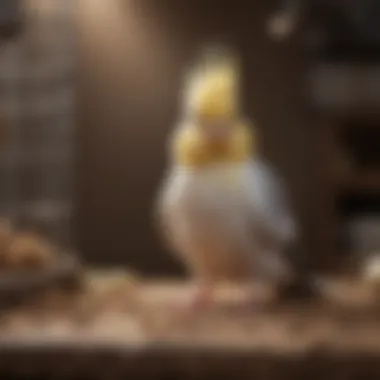
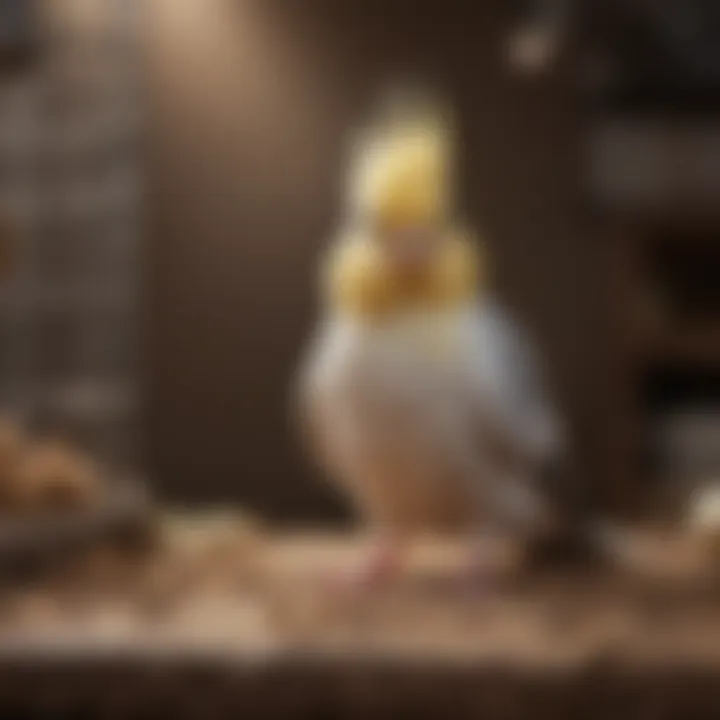
Avoiding drafts and direct sunlight
Direct exposure to drafts and harsh sunlight can be detrimental to a cockatiel’s health. It’s essential to avoid placing the cage near air conditioning vents, open windows, or direct sunlight. Both drafts and heat can lead to stress and even illness in birds.
Creating a comfortable environment is crucial for their mood and overall health. A well-placed cage reduces stress, allowing for a peaceful living space that nurtures the cockatiel's happiness.
In summary, choosing the right cage encompasses factors like size, materials, and placement. Addressing these elements can lead to a significant impact on a cockatiel's behavior and overall life quality. This new home will serve as their sanctuary, so think twice before making that choice!
Environmental Enrichment
When it comes to cockatiel care, environmental enrichment emerges as a vital piece of the puzzle. This aspect focuses on enhancing the well-being of your feathered friend by replicating enriching experiences they would have in their natural habitats. Unlike us, birds are creatures of habit, requiring not just a space to live, but an engaging and stimulating environment to thrive.
A barren cage can lead to behavioral issues like excessive screaming or feather plucking; thus, it's crucial to provide activities that mimic their natural instincts. This could include climbing, foraging, and interacting with toys. Enrichment techniques motivate cockatiels to keep their minds sharp and bodies active, which contributes greatly to their overall health.
"An idle bird is a bored bird." This saying captures the essence of why stimulation is key in the lives of our avian companions.
Importance of Stimulation
Stimulation is paramount for cockatiels. Keeping their minds busy is essential, as these birds possess intelligence comparable to small dogs. When a cockatiel is mentally engaged, it reduces stress and prevents boredom that can lead to problematic behaviors. Offering different types of stimulation helps maintain their natural instincts, which is crucial for their long-term happiness.
Consider incorporating various forms of stimulation into their daily routine, whether it is through simple interactions with their owners or the introduction of new toys or activities. The more mentally stimulating their habitat is, the more content they'll be.
Toys and Accessories
Types of safe toys for cockatiels
Safe toys for cockatiels range from chewable wooden blocks to hanging ropes. The significance of these toys goes beyond mere entertainment; they actively promote healthy beak wear and can also provide a critical outlet for natural chewing behaviors. Cockatiels are inclined to explore their environments, and using safe materials makes it easier for them to engage without risk.
Key Characteristic: Durability is crucial when choosing toys. Toys made from untreated wood or bird-safe plastics not only stand the test of time but also offer the safety your bird deserves.
Unique Feature: Opting for toys that engage in different ways, like those that squeak or rattle, can enhance your cockatiel’s curiosity and encourage play. These toys may have a downside of wear and tear but their impact on your bird’s playtime vastly outweighs this.
Arrangement for optimal engagement
Positioning toys in a way that promotes exploration is a key aspect of arrangement. Grouping toys in various sections of the cage will help to encourage movement; your cockatiel may have to hop from one area to another or climb to reach their favorite item.
Key Characteristic: Accessibility plays a significant role. Toys should be easy to reach but also challenge your bird enough to keep things interesting.
Unique Feature: Swapping out toys every few weeks can vastly improve engagement. This variability encourages your pet to investigate, as new stimuli will spark their interest continuously.
Natural Elements in the Cage
Use of perches and branches
Natural branches and perches serve multiple purposes for a cockatiel's well-being. They are not only perching spots; they also support foot health by providing various diameters for grip that encourages muscle use in your bird's feet. Such variety prevents the common issues seen with flat, solid perches, like pressure sores.
Key Characteristic: Using untreated branches from safe wood types such as oak or maple can effectively recreate their natural perching habits.
Unique Feature: Incorporating different heights and types of perches will promote exercise and stimulate your bird’s inherent instinct to explore their environment, which is a huge plus.
Benefits of adding foliage
Integrating fresh, non-toxic plants into the cage offers visual appeal and boosts air quality. Plants act as natural stress relievers for cockatiels. They provide a sense of security, along with additional perching opportunities and visual stimuli that can keep them engaged throughout the day.
Key Characteristic: Your choice of foliage needs to be safe for birds; many common houseplants can be toxic.
Unique Feature: When well-placed, plants can serve as hiding spots, giving your cockatiel a private space that can help them feel more secure in their environment. This can, in turn, lead to a happier bird that is better socialized.
Social Interaction and Bonding
Understanding the significance of social interaction and bonding with your cockatiel cannot be overstated. These birds are inherently social creatures, needing daily engagement to thrive both psychologically and physically. When you interact with your cockatiel, you help cultivate its personality. The better the connection you establish, the more secure and content your feathered companion becomes.
Incorporating regular bonding activities into your routine can do wonders for your pet's emotional health. It creates a sense of security, reinforces trust, and encourages playful behavior. Moreover, strong social bonds help in reducing anxiety in cockatiels, often leading to fewer behavioral issues down the line.
Building Trust with Your Cockatiel
Developing trust between you and your cockatiel is a gradual process. Trust can’t be rushed; rather, it’s best built through consistent and gentle interaction. A bird that feels safe around its human companion is more likely to show affection, such as preening or playing. It’s crucial to approach your bird calmly, speaking in soft tones and allowing it to adjust to your presence. It might take some time for your cockatiel to come out of its shell, but patience is key. Some effective strategies include offering treats or talking to them frequently to create a comforting atmosphere.
Time Spent Out of the Cage
Recommended duration for daily interaction
It might seem like a no-brainer, but knowing how long to spend with your cockatiel outside its cage is vital. Generally, an hour of interaction daily can significantly affect your bird’s mood and behavior. By regularly stepping out of the cage, your cockatiel gets to stretch its wings and explore its surroundings, which is great for mental stimulation. This activity also helps reduce stress, as it allows your pet to engage in natural behaviors like flying and perching.
The key characteristic of this timeframe? It balances both the bird’s need for exercise and your busy schedule. A recent study highlighted that birds receiving ample out-of-cage time show fewer signs of frustration and aggression, marking this as a popular and beneficial practice among bird owners.
One unique feature of daily out-of-cage time is that it encourages bonding. Each moment spent together strengthens the connection between you and your feathered friend, enhancing trust and mirroring their natural social behaviors.
Safe spaces for free time
Creating a safe area for your cockatiel to roam during its out-of-cage time is essential. This includes bird-proofing the environment by covering electrical wires, securing windows, and removing any household hazards. A designated play area or a specific room can become that safe haven. The critical aspect of these spaces is that they give your pet a sense of security while allowing freedom.
Why is it a beneficial choice? It allows the cockatiel to engage in its natural exploratory behavior without dangers looming nearby. Safe spaces enable the bird to interact with its surroundings, fostering confidence and social skills.
A unique benefit of these environments is the freedom they provide for exploration and autonomy. However, you should always supervise your cockatiel during this time, as curious birds can get into precarious situations even in a controlled area.
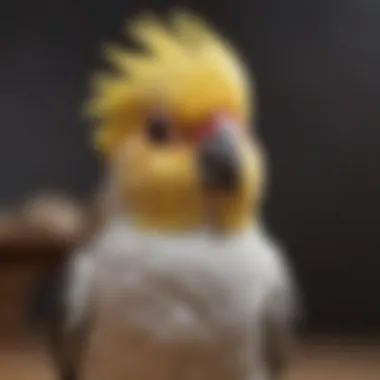
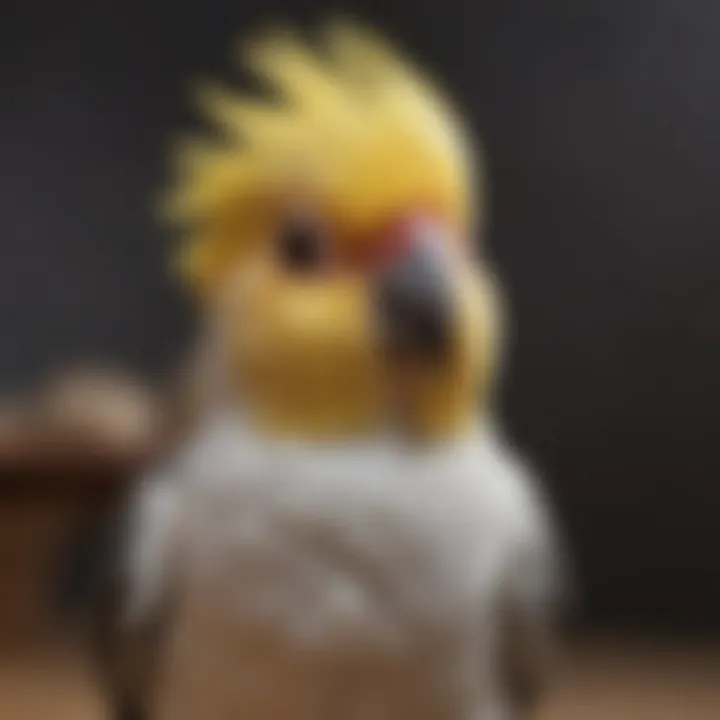
Remember, a happy cockatiel is an engaged cockatiel. The more time you invest in social interaction, the healthier and more vibrant your feathered friend will be.
Nutritional Needs for Cage Life
When caring for cockatiels, understanding their nutritional needs is paramount. A balanced diet does not only enhance their physical health but also plays a significant role in their mood and behavior. Birds thrive when fed properly and not providing the right nutrients can lead to a host of health issues.
Quality Diet for Cockatiels
A quality diet for cockatiels comprises various components. Let's break it down further.
Pellets versus seeds
When weighing pellets against seeds, many owners wonder which option is healthier. Pellets are often considered the gold standard in avian diets. They are designed to contain a complete nutrition profile for birds, with the right proportions of vitamins, minerals, and proteins. The key characteristic of pellets is their uniformity; each bite provides a set amount of nutrients, minimizing selective feeding.
On the other hand, seeds may be appealing to cockatiels but can lead to an imbalanced diet. Seeds, especially sunflower and safflower, are high in fats. While tasty, if given exclusively, they might contribute to obesity or deficiencies in vital nutrients. So going predominantly for pellets is typically beneficial when we talk about overall health. The unique feature of pellets lies in their formulation, which is specifically engineered for cockatiels, unlike seeds that can vary widely in nutrient composition.
Incorporating fresh foods
Introducing fresh foods into a cockatiel’s diet is advantageous and provides variety, enhancing their overall wellbeing. Fruits and vegetables can become part of their standard menu, providing not only hydration but also essential vitamins. Mixed leafy greens, carrots, and apples are examples of foods that are well-received. They are also beneficial for maintaining feather quality.
The exciting aspect of including fresh foods is that it enriches their dining experience. Fresh foods can help prevent boredom, which is critical for mental stimulation. However, it’s essential to wash these items thoroughly, as pesticides and chemicals can be harmful to your bird. Also, not all fresh foods are safe, so understanding which fruits and vegetables to prioritize is vital. Ultimately, while fresh options can diversify the diet, it’s crucial to maintain balance with the main diet consisting of pellets.
Hydration Importance
Hydration can’t be overstated, as water is as significant as food. Cockatiels must have constant access to clean water to keep them healthy and energetic. Dehydration can affect their overall wellbeing and lead to severe health issues.
Water quality considerations
Ensuring water quality is critical. Clean, fresh water is essential, as contaminated water can lead to infections, gastrointestinal problems, or other serious health concerns. Regular monitoring of water quality should include checking for any changes in smell, color, or taste. It’s a good guideline to offer fresh water at least twice a day, particularly if the cage is placed in a warm environment where evaporation rates may be higher.
Another point to note is that some owners prefer to use filtered water or even bottled water. While tap water might be fine in many areas, treating it before offering to your bird can prevent potential exposure to chlore. The feature that makes careful water management so essential revolves around the fact that even slight pollutants can have detrimental effects on your cockatiel's health.
Regular cleaning of water sources
Keeping water sources clean provides not just a means of hydration but is part of creating a healthy habitat. Regular cleaning of bowls is pivotal, as old water can become a breeding ground for bacteria. A consistent cleaning schedule, perhaps every couple of days or whenever you change the water, should be followed.
This practice ensures that your cockatiel always has access to the best quality water. Additionally, switching out water daily is also recommended. This simple step can immensely impact your bird's hydration status and mitigate health risks. The routine of cleaning the water container can also become an indicator of how attentive you are to your bird's environment.
Remember, consistent quality in diet and hydration promotes not just a longer lifespan but happier, healthier cockatiels.
Monitoring Health in the Cage
When it comes to the overall well-being of your cockatiel, keeping a watchful eye on their health is paramount. Monitoring the health of your bird not only ensures they thrive in their habitat but also helps you catch any issues before they escalate. The physical and psychological condition of a cockatiel can fluctuate based on various factors--from diet and habitat to social interactions. Hence, being attentive to their changes can make all the difference in providing them a happy, fulfilling life.
Signs of a Healthy Cockatiel
A cockatiel's overall health can often be assessed through a variety of visible indicators. Observing these signs can give bird owners confidence that their feathered friends are thriving:
- Vibrant plumage: A shiny, well-kept coat is a telling sign that your cockatiel is in good health.
- Active behavior: Healthy cockatiels often engage in playful antics, indicating good mental and physical health.
- Bright, clear eyes: A cockatiel's eyes should be bright and clear without any discharge.
- Regular eating and drinking habits: Proper nutrition and hydration play a massive role in their health.
- Normal droppings: Healthy droppings should be a mix of firm and a bit watery; any drastic changes should raise a flag.
If you notice these indicators, your cockatiel is likely content in their environment. However, it’s essential to recognize any deviations from this picture of health, as they might suggest underlying issues.
Common Health Concerns
Keeping your cockatiel’s health in check involves knowledge of common illnesses and issues that can arise. Knowing what to look for is crucial in preventing problems or managing them effectively. Some of these concerns include:
- Respiratory infections: These are quite common and can arise from drafts or poor ventilation in their cage.
- Feather plucking: Stress or boredom may lead to this behavior, and addressing it promptly allows you to provide proper enrichment.
- Obesity: An unbalanced diet or lack of activity can make your cockatiel overweight, impacting their overall health immensely.
Recognizing Behavioral Changes
Spotting any behavioral changes can be crucial in understanding your cockatiel's health. Changes such as lethargy, loss of appetite, or unexplained aggression can hint at something being off. These behavioral shifts often serve as an early warning signal for more serious issues. For instance, if your cockatiel was once a social butterfly but now prefers solitude, this can suggest stress or illness. Being alert to these changes can enable you to take timely action, potentially saving your bird's health.
The uniqueness of behavioral changes lies in their ability to manifest from internal discomfort or environmental stressors. For observant owners, the rewards of this vigilance can’t be overstated, as early interventions can lead to much better health outcomes.
Importance of Veterinary Checkups
Regular veterinary checkups should be treated as a non-negotiable aspect of health monitoring for your cockatiel. These comprehensive exams help catch potential issues before they snowball into significant concerns. During these checkups, a professional can assess the bird's physical status, provide necessary vaccinations, and offer advice tailored to your pet's needs.
The main advantage of having routine checkups is peace of mind; knowing your cockatiel is healthy or catching issues early is invaluable. A key characteristic to consider is that these visits not only attend to physical health but also ensure that any behavioral aspects of care are addressed. It's a holistic approach to keeping your feathered companion in top shape.
Adhering to veterinary advice also fosters a proactive rather than reactive approach to your bird's health. Being prepared and well-informed can immensely elevate your understanding and care of your cockatiel's welfare.
Culmination
The culmination of our exploration on cockatiel care through proper cage selection emphasizes how pivotal the right environment is for these delightful birds. When you consider the right cage, you are not just choosing a piece of furniture; rather, you are establishing a core aspect of your cockatiel's quality of life. The dimensions of the cage, the materials used, and it's placement play fundamental roles in both the physical and mental well-being of your pet.
Summary of Key Insights
A cockatiel is a social creature requiring ample space to stretch its wings, engage in playful behavior, and rest comfortably. There’s an undeniable connection between the size of the cage and the mental health of these birds. Smaller cages can lead to frustration and health issues, while a spacious, well-planned habitat can turn a simple living space into a sanctuary.
In terms of materials, it’s vital to avoid harmful substances. Invest in cages made from non-toxic materials, ensuring every bar and perch is safe for your feathered companion. Proper wire spacing is essential too; this prevents escape and injuries, thereby creating a secure environment for your cockatiel.
Placement, on the other hand, deserves careful thought. Avoid areas with drafts and excessive sunlight. Instead, choose spots where your cockatiel can enjoy visibility without feeling threatened or isolated. A well-placed cage keeps your bird comfortable, contributing significantly to its happiness.
Final Thoughts on Cockatiel Care
Caring for a cockatiel is more than just feeding and cleaning. It involves creating a nurturing environment filled with stimulation, safety, and comfort. As you wrap your head around the complexities of cockatiel care, remember that a well-designed cage can be a marvelous investment. Not only will this habitat help in fostering a healthy lifestyle, but it also supports the loving bond you share with your pet.
In the journey of bird ownership, each aspect contributes to the whole. Your dedication to understanding and implementing the right cage setup sends a clear message: you’re committed to your cockatiel's happiness and well-being. So, as you stand together in your shared space, take pride in knowing that every detail counts in making your home the best it can be for both you and your beloved bird.
“A happy cockatiel can turn the mundane into the extraordinary, painting your days with joy and feathered laughter.”
With this information, you’re now well-equipped to create a haven for your cockatiel, enriching its life and, in turn, enhancing your bond with this wonderful companion.















